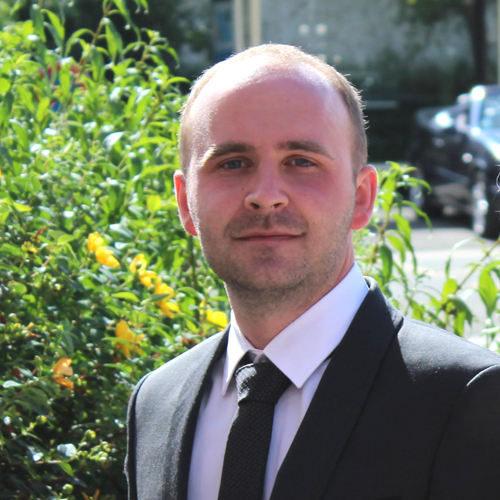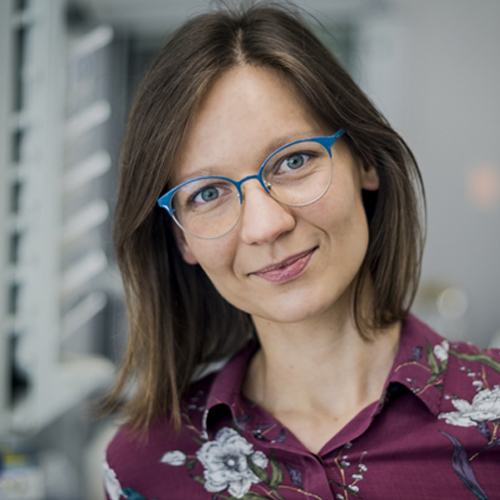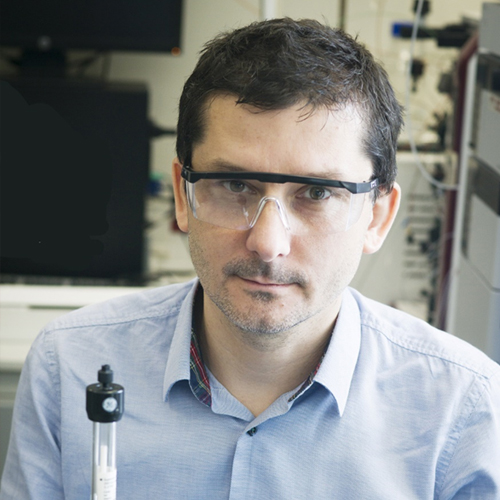Partner 2’s teams

Dr Florian Veillard
Florian Veillard studied at the University of Tours (France) where he obtained his PhD in biochemistry in 2009 for his work on the role and regulation of proteases implied in inflammatory pulmonary diseases. He then joined the University of Louisville Dental School (USA) for a post-doctoral fellowship (2010-2012) during which he studied the virulence mechanisms of the main etiological agent of periodontitis, the bacteria P. gingivalis. Back in France, he integrated the CNRS (Centre national de la recherche scientifique) as a project manager on an ERC Grant to decipher the innate immune system of the model organism Drosophila melanogaster (2013-2018). As a team leader in the FixNet project, he is responsible for the cellular and functional characterizations of the neutrophils from neutropenic patients and the IPS-derived cell lines.

Dr Barbra Chruścińska-Smaga
Doctor of Medical Sciences with fourteen years of experience in laboratory work, co-author of several scientific publications and coordinator of national projects including in collaboration with industry. She is a graduate of the Faculty of Biochemistry, Biophysics and Biotechnology, of the Jagiellonian University in Kraków (2009). She defended her doctoral thesis at the Institute of Pharmacology of the Polish Academy of Sciences (2015) on the pharmacodynamic characteristic of novel allosteric ligands for GPCRs as new therapeutic agents in neuropsychiatric diseases. As a postdoctoral researcher at the Department of Anatomy & Neuroscience, University College Cork (2016-2018) she was responsible for establishing a high-throughput in vitro screening platform for bacterial-derived metabolites modulating GPCRs signaling in the context of gut-brain axes. In addition, she investigated heterodimerization, signaling cross-talk, and biased agonism of several GPCRs, using cell based systems. At the Małopolska Biotechnology Center of the Jagiellonian University (2018-2020) her research focused on post-translational modifications of proteins and peptides as a new biomarker associated with chronic infectious diseases. As a PostDoc in the Fix Neutropenia (FIXNET) project, she focuses on functional characteristics of peripheral granulocytes in patients with neutropenia.

Dr Justyna Folkert
PostDoc in the project Fix Neutropenia (FIXNET). In the project she deals with analysis of physiological function of neutrophils including chemotaxis, phagocytosis, bactericidal activity, respiratory burst, and others.
A biotechnologist by profession, in 2019 she received a doctoral degree from Silesian University of Technology in Gliwice (thesis theme: “The effect of rhamnogalactoronan-I on osseointegration. In vitro study”). She performed her PhD studies in two international research institutions (Charité Medical University, Berlin, Germany and University of Birmingham, UK) where she has participated in several research projects investigating natural sources of biomaterials, derived from plants having osteogenic properties. In her research she used different in vitro cell culture models (osteoblasts, fibroblasts, neutrophils, and macrophages) as well as molecular biology techniques (Real Time PCR, FACS, etc.) to investigate the ability of plant-derived pectins to stimulate osseointegration. Her research activity resulted in the publication of several articles in renowned scientific journals.

Dr Stanisław Malicki
Research Assistant in the project “FIXNET" at the Department of Microbiology, Jagiellonian University. He received his PhD in the field of Biological sciences at the Faculty of Biochemistry, Biophysics and Biotechnology UJ. His expertise in molecular pharmacology and biochemical analysis was developed during his PhD work in the Department of Cell Biochemistry, UJ, and expanded during his employment at the Friedrich-Alexander-Universität Erlangen-Nürnberg and at the Malopolska Centre of Biotechnology. During his scientific career he has been involved in projects aimed at immune-mediated diseases and research and development projects aimed at developing functional molecules with potential pharmacological use in a consortium with pharmaceutical companies. Co-author of scientific publications and patent applications.
As a research assistant in the Fix Neutropenia (FIXNET) project, he focuses on the characteristics of the biological functions of primary cells in host-pathogen interactions studies.

Dr Jakub Kwieciński
Project Leader of the team responsible for development of mouse models of congenital neutropenia, and for their functional characterization, especially in a context of bacterial infections.
Jakub obtained his MSc in Medical Biotechnology in 2008 at the Jagiellonian University, and PhD in Medical Sciences in 2013 at the University of Gothenburg. He gathered further experience during postdoctoral appointments at the University of Chicago, the University of Iowa, and the University of Colorado. During his studies, Jakub developed expertise in animal models of autoimmunity and infection, which he deepened in his later work on bacterial gene regulation, host-pathogen interactions, and immune evasion.
The FIXNET project forms part of Jakub’s current research interest in bacteria – neutrophil interactions.

Dr Izabela Ciastoń
Postdoc in the project Fix Neutropenia (FIXNET): focusing on neutrophil proteases defects which serve as novel diagnostic and therapeutic options. Since 2009, associated with the Department of Microbiology at the Faculty of Biotechnology, Biochemistry and Biophysics of the Jagiellonian University. Her field of interest is related to the evaluation of the modulation of immune response during bacterial infections. During her scientific work, she participated in many projects focused on therapy in Clostridium difficile infection, the role of periopathogens in T cells differentiation, analysis of etiology of bacterial co-infection during cystic fibrosis and infection with Candida albicans or the role of Porphyromonas gingivalis on the formation of neutrophil extracellular traps. Co-author of 9 scientific publications, participant in many conferences and principal investigator in PRELUDIUM 11 project, where she demonstrated the proinflammatory effect of enzymatically inactive gingipains – the main virulence factors of P. gingivalis. In 2019 she defended her doctoral thesis about the biological role and mechanism of action of inactive gingipains. Her experience in working with animal models will be used in FIXNET project, where she will be responsible for determining the effect of genetic modifications in neutrophils present in neutropenia on bacterial infections in different in vivo models.

Dr/PostDoc Karina Adamowicz
Postdoc in the project: Fix Neutropenia (FIXNET): focusing on neutrophil proteases defects which serve as novel diagnostic and therapeutic option.
Associated with the Department of Microbiology at the Faculty of Biochemistry, Biophysics and Biotechnology of the Jagiellonian University, where she started doctoral studies and obtained a doctoral degree in 2016. During the conducted research, Dr. Adamowicz was mainly involved in projects concerning host-pathogen interactions thanks to which she broadened her knowledge of microbiology and immunology. During her scientific career, she has been involved in research on chronic kidney disease, in particular the influence of uremia on the modification of the immune system and the development of infections. Her research activity resulted in the publication of several articles in renowned scientific journals.
Thanks to many years of experience in working on animal models, gained both in Poland and abroad (University of Louisville, USA), the project will focus on the implementation of in vivo models of neutropenia, as well as determining the role of neutrophil genetic mutations in bacterial infections in in vivo models.

Doktorant/PhD Student Michał Kanoza
PhD student in the project Fix Neutropenia (FIXNET): focusing on neutrophil proteases defects which serve as novel diagnostic and therapeutic options.
Michał is a graduate of Biochemistry from the Faculty of Biochemistry, Biophysics and Biotechnology of the Jagiellonian University. He is currently a PhD student at the Doctoral School of Exact and Natural Science. In June 2020, he defended his master thesis, in which the research included the effect of cysteine proteases from Porphyromonas gingivalis (gingipain) on the modification of the pro-inflammatory response of gingival keratinocytes activated by Poly (I:C). He has experience in working with various types of eukaryotic cells (including: neutrophils, monocytes, keratinocytes, fibroblates). What is more, during a studies he developed his research workshop using viruses and bacteria. In his interests, he focuses on intracellular signaling, its modulation and the subsequent change in the response of the immune system. In the project, he acquires experience in working with animal cells, which will allow him to describe the defense potential of granulocytes from animals with mutations defined for neutropenia.